Muslim Festival and sacrifices
The birth day of Mohamed is a very special day in the Muslim calendar for prayers and feasts. Not the best of days for the goats and sheep however, especially the sacred white ones, as every family is duty bound to sacrifice an animal to share for the festival. Around noon we stopped in sight of a small tent encampment where prayers were going on. Al Hadana was only carrying a small hold-all, and that he now revealed was almost filled to bursting with his best white robes of the precious fine-patterned 'bazin' damask cotton and a black gleaming indigo shesh. He rode off for prayers, obviously conscious that he cut a fine figure .
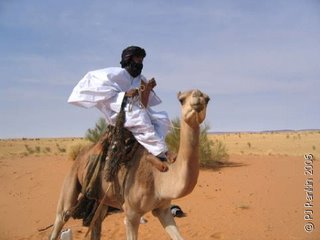
Omar wore his wallet, a decorated leather sliding pouch and like all Tuareg men come of age, his razor sharp sword - serious stuff almost as big as him! After a wild whooping charging-camel return to our little band from the ceremony, the robes were very carefully repacked again until arrival at the Essakane festival.
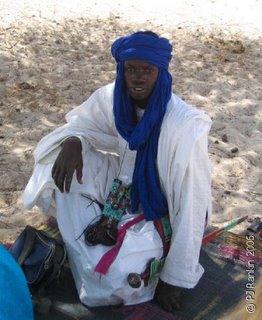 We stopped mid-afternoon to make camp for the night on some dunes. Just over the rise was one of those amazing ancient scenes you come across in the Sahara, lit golden in the late afternoon. Lines of animals being led by their herders across the sand to an ancient well. Herders wait their turn, each carrying their own worn wooden pulley to put over the wooden axle born by the Y-shaped supports over the well mouth. A boy drives the donkeys out, pulling about 30-40 metres of rope to haul a big leather bag heavy with water up from the depths beneath the desert, to the accompaniment of pulley screeches and donkey complaints. The precious water is then tipped into shallow troughs for thirsty animals to push to get and the donkeys are returned to the well to start all over again. I watched the scene for while and strolled down to the well. One of the herders recognised me from Araoune 4 years ago !
We stopped mid-afternoon to make camp for the night on some dunes. Just over the rise was one of those amazing ancient scenes you come across in the Sahara, lit golden in the late afternoon. Lines of animals being led by their herders across the sand to an ancient well. Herders wait their turn, each carrying their own worn wooden pulley to put over the wooden axle born by the Y-shaped supports over the well mouth. A boy drives the donkeys out, pulling about 30-40 metres of rope to haul a big leather bag heavy with water up from the depths beneath the desert, to the accompaniment of pulley screeches and donkey complaints. The precious water is then tipped into shallow troughs for thirsty animals to push to get and the donkeys are returned to the well to start all over again. I watched the scene for while and strolled down to the well. One of the herders recognised me from Araoune 4 years ago !

Mohamedune came to speak with me. It seemed that our band, already disappointed that they could not be with their familes on this sacred day, were upset that they could not afford an animal to sacrifice . I offered to help with a modest contribution. After a long discussion with the herders, eventually a special deal was struck for a sheep with one herder- of course one of our group's extended Tuareg network of cousins- much to everyone's relief.
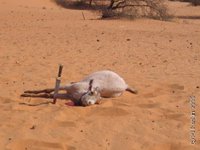 The unfortunate animal was led off to the sand near where I happened to be sitting and had its throat slit by Al Hadana's razor sharp knife. Feeling responsible for the death I felt bound to watch somewhat sickened as without a murmur the animal looked back at me, its blood draining into the sand.
The unfortunate animal was led off to the sand near where I happened to be sitting and had its throat slit by Al Hadana's razor sharp knife. Feeling responsible for the death I felt bound to watch somewhat sickened as without a murmur the animal looked back at me, its blood draining into the sand.
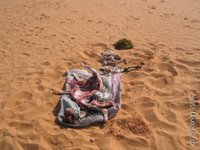 It took a few minutes to die and the last kicks to cease, although presumably it was a fairly painless end. The butchering was very efficient, with younger Omar and Mohamed getting lessons- meat is rarely affordable for these people. Within a few minutes, the animal was skinned and reduced to a carcase and pieces of meat, the skin being stretched over acacia bush thorns to dry. Nothing gets wasted.
It took a few minutes to die and the last kicks to cease, although presumably it was a fairly painless end. The butchering was very efficient, with younger Omar and Mohamed getting lessons- meat is rarely affordable for these people. Within a few minutes, the animal was skinned and reduced to a carcase and pieces of meat, the skin being stretched over acacia bush thorns to dry. Nothing gets wasted.
Mohamedune called out to a local woman, silhouetted on nearby dune, her black robe billowing. The woman seemed frightened of strangers, so he gathered up the skin, the head and intestines and went off to catch her. As he said later, 'When you are lucky to have, it's necessary to share with those that don't'. That's the Muslim way.
Later as the meat was barbecued that night, as a mark of honour we were brought the liver and kidneys as special delicacies on the silver tea platter, although the more ordinary joints that they ate would probably have been preferred! (Luckily the woman's family enjoyed the eyes, I guess.) The meat lasted our party several days, adding taste to the enormous bowls of rice everyone seems to polish off and providing much relished fat for a nomad's diet.
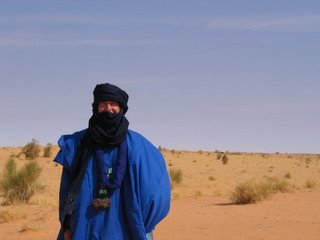


0 Comments:
Post a Comment
<< Home